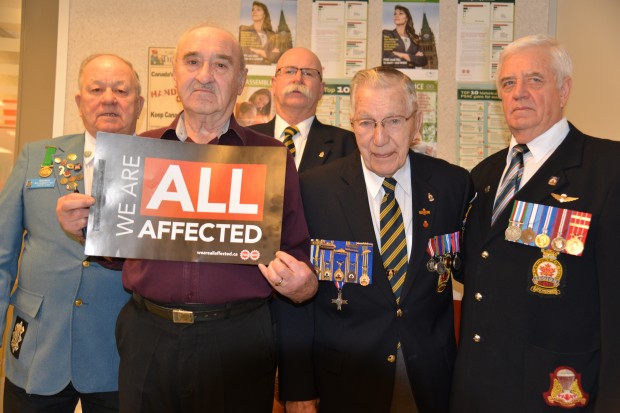By Glyn Bowerman
Veterans and service providers across the country are being asked to wear black ribbons and attend memorial services for the loss of eight Veterans Affairs offices.
The federal government officially closed the offices today, leaving roughly 90 front line veteran services providers to look elsewhere and directing affected veterans to Service Canada offices instead.
“The Service Canada sites can not provide the same amount of services that we do,” says Michelle Bradley, national vice president of the union of veterans affairs employees.
Bradley is currently preparing her Saint John, NB office for the displaced veterans from Charlottetown, PEI, (one of the offices on the chopping block), a roughly three-hour trip.
“In order to properly service these men and women, it’s important to be able to know their history and just exactly where they come from,” says Bradley
Bradley says Service Canada employees won’t have access to the wealth of information included in files dedicated to each veteran: including medical needs, military history and other facts relevant to personalized care.
“It’s impossible to have an understanding of what we do at veterans affairs when there’s a lot of misinformation,” says Bradley.
“The general public – and we’re hoping to get that message out – doesn’t have a good grasp on what services we offer to our clients and how much we are needed.”
“I’m personally sickened,” says veteran Jordie Yeo. “For a government that says that they’re always looking out for veterans’ rights, and the best service for veterans, and that they’re on the side of the military, this completely goes in the face of what they’re talking about.”
“I find it very hypocritical.”
Yeo was injured during service in Bosnia, suffers from PTSD, and uses the services provided by Veterans Affairs.
He says the caseworkers know their clients and have special training in effective treatment and personal assistance, something Service Canada employees can’t provide.
For other services, such as connecting veterans with employment, the government has encouraged people to go online. But, Yeo says, some of the necessary forms aren’t available online and the ones that are can be difficult to navigate.
While requests for an interview with the Ministry of Veterans Affairs were declined, spokesperson Simon Forsyth said in an email statement, “we are adjusting our national presence to improve service delivery by placing resources where Veterans need them.”
“As of Monday, Feb. 3, there will be a VAC staff person available at the Service Canada office nearest the area office that is closing.”
For Yeo, the decision is simply “dollars and cents.”
“I think somebody in a department somewhere thought that it would be really easy to cut costs in certain departments, Veterans Affairs being one of them, and the easiest thing to do is get rid of bricks and mortar and people,” says Yeo.
Calls for Fantino to step down
The closures protests, led by the Public Service Alliance of Canada, come days after a heated meeting between concerned veterans and Veterans Affairs Minister Julian Fantino, which led some to call for Fantino’s resignation.
“I was actually there with the veterans in Ottawa when he came into the green room at the press gallery, after missing the meeting with them,” says Bradley.
“He became very dismissive and didn’t want to hear their point of view.”
“He needs to go,” says Yeo. “The arrogance, and the attitude that he showed us in person – and has shown me in person on numerous occasions – is completely and totally disrespectful.”
Yeo says he will join other veterans on Parliament Hill, next Monday, to watch a vote on whether or not to reopen the offices.
“We’re making sure that we’re going to be able to see Minister Fantino and Prime Minister Harper’s face when they vote no.”
“We want to look them in the face when they actually decide to screw us over.”


